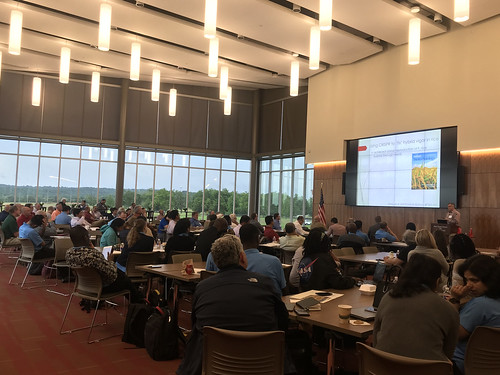Industry Alliance Meeting showcases research that could fight nutrient deficiencies; examines AWD rice production
By Abbi Ross
U of A System Division of Agriculture
Fast facts
- Annual Industry Alliance meeting provides research reports to sponsors, partners
- Hosted by the U of Arkansas System Division of Agriculture’s Rice Processing Program
- Research included rice drying, storage, millage, processing methods, bin storage, fortification
(658 words)
(With art at https://flic.kr/s/aHsmF49zqH)
FAYETTEVILLE, Ark. – Rice, already a staple grain for billions around the planet, could become an even more important food source with additional nutrients. Researchers with the University of Arkansas System Division of Agriculture’s Rice Processing Program presented this, and other hopeful insights based upon their academic research at the Annual Industry Alliance Meeting.

The 2019 meeting was organized and hosted by the Rice Processing Program, led by Terry Siebenmorgen, distinguished professor of food science. He said program researchers annually report on their work to sponsors and corporate partners.
“The Industry Alliance Meeting serves as a platform to provide research results to the companies that sponsor the Rice Processing Program,” Siebenmorgen said. “It is also a venue that brings together the rice processing industry to discuss and address current needs of the industry.”
This year's presentations included research in evaluating production methods, grain drying and processing techniques in which rice can improve nutrition and/or consumer acceptance.
- Seth Graham-Acquaah, a Ph.D. candidate in food science, presented research on the impact of alternative irrigation practices on rice quality. His study evaluated the effect of alternate wetting and drying — a method of intermittent irrigation that doesn’t rely on maintaining a continuous flood — on rice quality criteria including milling yields, chalkiness and pasting properties, which indicate how rice will function in food production.
- Graham-Acquaah found that the use of alternate wetting and drying, which can reduce water use by as much as 30 percent,with multiple-inlet delivery did not impact milling yields of rice when compared to rice grown with the conventional, continuous-flood method. The alternative method did, however, produce rice with slightly greater chalkiness, as well as a lesser “setback viscosity” — a parameter often used by end-use processors of rice as an indication of the way rice will perform during processing.
- Kaushik Luthra, a senior graduate assistant and Ph.D. candidate in the college of engineering, described research on wireless sensors for monitoring conditions of rice during on-farm, in-bin drying and storage. Luthra’s study tested the accuracy and precision of wireless sensors that can be used in rice storage bins. Continuous measurement of temperature and moisture content is vital for ensuring rice quality, and wireless sensors are a new technology to accomplish this.
- Annegret Jannash, a master’s degree candidate in food science, gave a presentation describing how parboiling could fortify rice with mirco-nutrients. Use of fortified rice could alleviate vitamin and mineral deficiencies. Jannash also investigated the optimization of parboiling conditions to fortify rice with minerals while minimizing water usage.
- Wipada Wunthunyarat, another master’s degree candidate in food science, studied whether germinating rice before turning it into flour would improve leavening in gluten-free bread, and whether enzyme action on starches and proteins would be different if the germination was performed under anaerobic conditions, versus aerobic conditions. She concluded that aerobic germination of brown rice for four days will produce a flour that makes a gluten-free bread that’s less dense, produces a softer crumb and will have a longer shelf life than breads made with flour ground from non-germinated rice.
Ken Korth, head for the department of entomology and plant pathology, also presented
at the meeting. Korth presented on using CRISPR technology for gene editing in rice
and how the technology differs from traditional breeding.
CRISPR, the common acronym for “clustered regularly interspaced short palindromic
repeats,” is a gene-editing process widely used in plants, animals and humans, Korth
said.
“With traditional breeding, you put out plots of plants and look for the phenotype
that you are interested in,” Korth said. Modern gene editing allows you to make very
precise changes in the genome, he said.
“The rice genome has about 430 million base pairs in every cell,” Korth said. “We
can go in, select one out of those millions, and change it however we want. It is
incredibly powerful.”
The technology is a game-changer, especially in the world of agriculture and plant
breeding, he said.
“In a broad sense, it’s a game changer in terms of accuracy, and how breeders can
select genes and the changes in genes that they want,” Korth said.
For more information about the Rice Processing Program, visit https://uarpp.uark.edu.
About the Division of Agriculture
The University of Arkansas System Division of Agriculture’s mission is to strengthen agriculture, communities, and families by connecting trusted research to the adoption of best practices. Through the Agricultural Experiment Station and the Cooperative Extension Service, the Division of Agriculture conducts research and extension work within the nation’s historic land grant education system.
The Division of Agriculture is one of 20 entities within the University of Arkansas System. It has offices in all 75 counties in Arkansas and faculty on five system campuses.
Pursuant to 7 CFR § 15.3, the University of Arkansas System Division of Agriculture offers all its Extension and Research programs and services (including employment) without regard to race, color, sex, national origin, religion, age, disability, marital or veteran status, genetic information, sexual preference, pregnancy or any other legally protected status, and is an equal opportunity institution.
Media Contact: Fred Miller
U of A Division of Agriculture
Arkansas Agricultural Experiment Station
(479) 575-5647
fmiller@uark.edu
Related Links